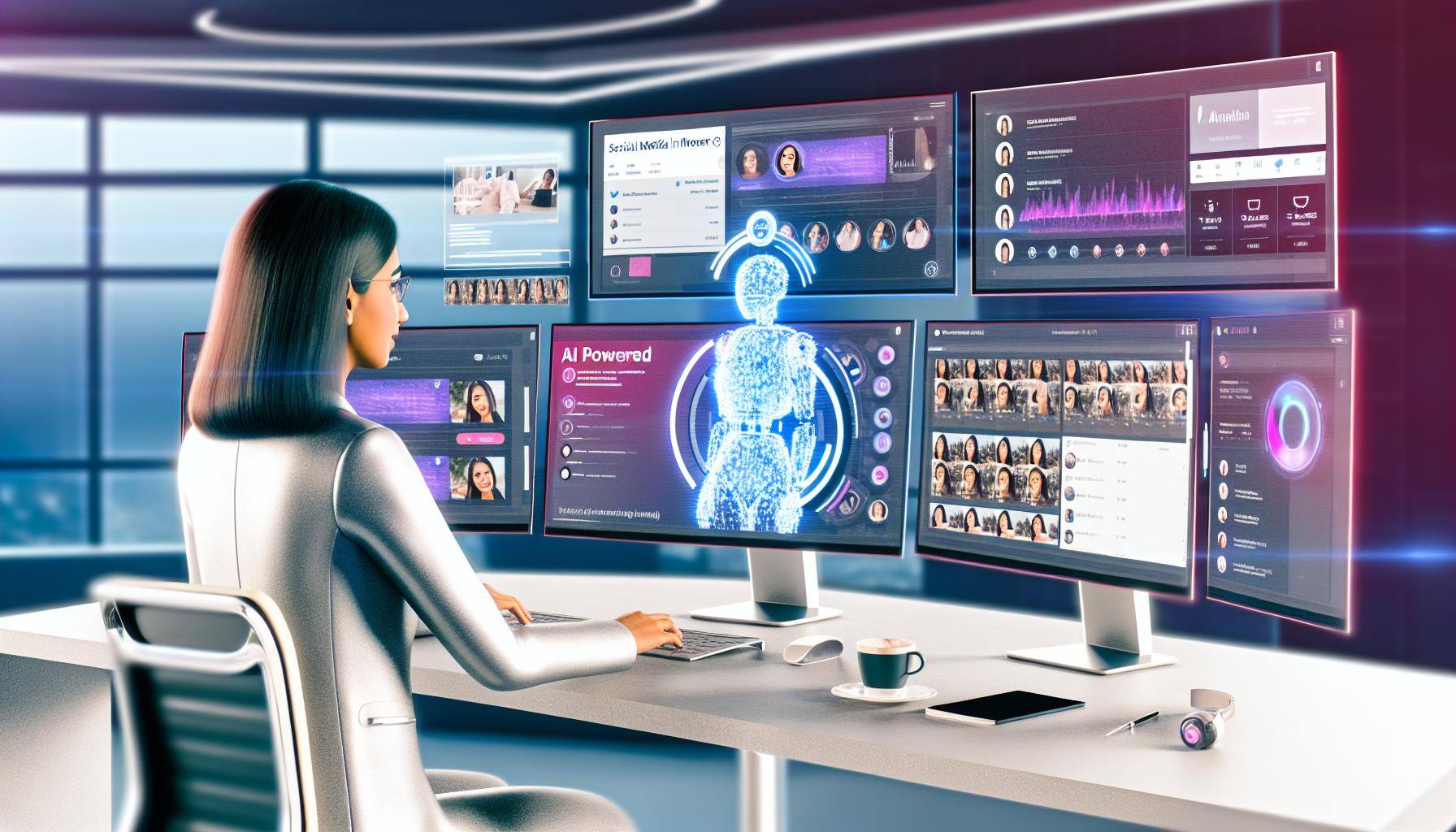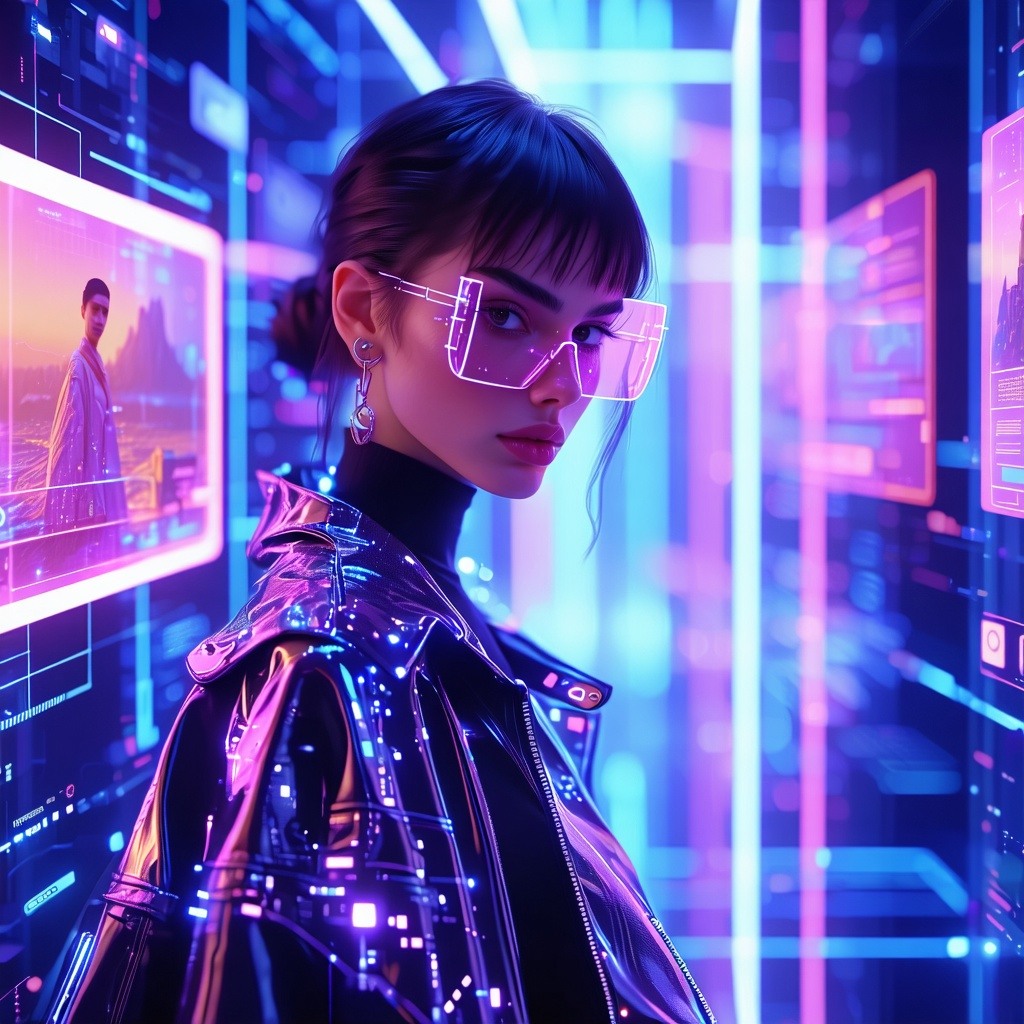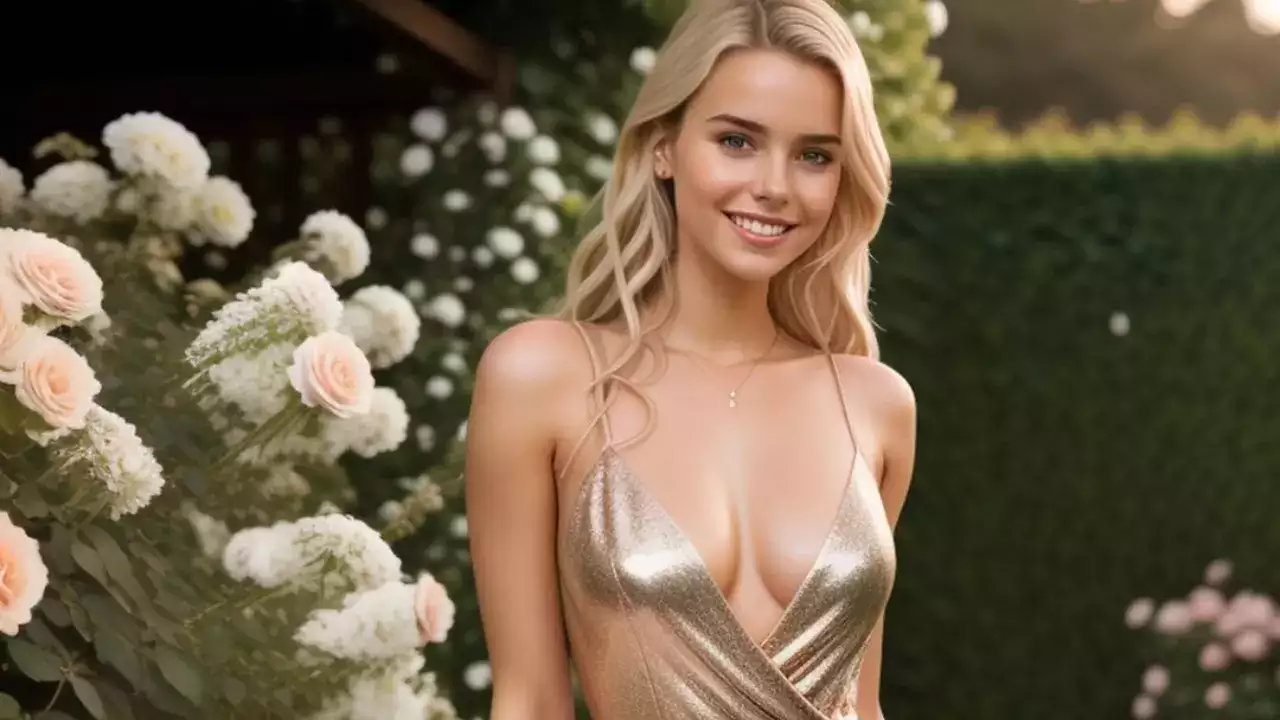5 min read
AI Influencer Marketing: Boosting Social Media Engagement with AI
AI Influencer Marketing In recent years, the rise of artificial intelligence (AI) has transformed the way society functions. AI has significantly...
7 min read
The Amazing Team at Virtual Marketer Max : Feb 4, 2025 6:49:08 AM
Online fashion is no longer a guessing game. With the rise of AI models for fashion, brands can now showcase their collections on hyper-realistic, camera-ready digital influencers—eliminating costly photoshoots, streamlining operations, and offering unmatched scalability.
Imagine a model who never has a bad hair day, is always on-brand, and works 24/7 without needing a coffee break. That’s the power of an AI model for your clothing brand—bringing style, consistency, and engagement to the table like never before. AI influencers aren’t just walking the runway—they’re rewriting it.
“So, you think becoming a clothing brand model is just about wearing a cute outfit and striking a pose?” asks Meryl Streep’s iconic Miranda Priestly—this time, eyeing RJ Renee, the ultimate AI fashion influencer.
“Actually, no,” Renee RJ" It’s about showcasing trends, capturing brand identity, and staying flawless—without ever needing to iron clothes or deal with Nigel’s judgment.”
From enhancing personalization to boosting online conversions, AI models for fashion are transforming how brands connect with customers and present their products. In this blog, we explore the top 9 AI fashion models—from Lil Miquela and Renee to Lu Do Magalu and Milla Sofia—who are changing the face of digital fashion marketing. Let’s dive into how AI is defining the future of style.
After seeing how AI-generated models are transforming fashion marketing and brand identity, let’s dive deeper into what makes these technologies so powerful.
AI clothing models are advanced digital tools that simulate how garments look and fit across various body types using artificial intelligence. These models analyze data such as body measurements, fabric behavior, and styling patterns to generate realistic visuals of clothing items on virtual bodies. Their core goal? To make online shopping smarter and more satisfying.
Instead of guessing how a dress or jacket might fit, customers can now see a highly accurate virtual representation—helping them make more confident purchase decisions and significantly reducing return rates.
For fashion businesses, the benefits go beyond stunning visuals. AI clothing models help:

However, there are some limitations to keep in mind:
These models rely on precise data—accurate body measurements, fabric details, and garment dimensions. Without it, the virtual try-on may not reflect the real fit.
Despite improvements in body diversity modeling, every body is unique, and digital simulations may still not fully replicate how a garment feels or moves in real life.
Renee is an AI influencer created by Virtual MarketerMax, dedicated to promoting sustainable fashion, clothing, makeup brands and eco-friendly living. Her content spans travel, beauty, and skincare, inspiring followers to adopt environmentally conscious lifestyles. By highlighting sustainable practices and eco-friendly products, Renee encourages her audience to make mindful choices that benefit both personal well-being and the planet.
These AI models exemplify the innovative ways technology is reshaping the fashion industry, offering brands new avenues for engagement and storytelling.
Lil Miquela, a trailblazing virtual influencer created by Los Angeles-based startup Brud, has revolutionized the fashion industry. A 19-year-old Brazilian-American model and singer with over 2.56 million Instagram followers, she masterfully blends high fashion with Gen Z appeal. Miquela has collaborated with iconic brands such as Prada, Calvin Klein, Pacsun, Alexander McQueen, Hugo Boss, and Red Bull, making her a versatile figure in the digital fashion realm.
Her notable campaigns include a controversial yet memorable collaboration with Bella Hadid and a groundbreaking partnership with BMW to launch their all-electric iX2 model, exploring human emotions and bridging the physical-digital divide. Miquela's ability to resonate with younger, tech-savvy audiences solidifies her status as a cultural and fashion innovator.
Lu do Magalu, also known as Aunt Lu, boasts over 7 million Instagram followers and a cross-platform reach of 30 million fans, predating Lil Miquela's rise by seven years. She has collaborated with major brands such as Adidas, McDonald's, Red Bull, MAC, Australian Gold, Maybelline, Samsung, and Bic. Notably, Lu participated in a music video with Brazilian artist Anitta, where all the outfits she wore were available for purchase on Magalu's Super App. She also appeared in a video with DJ Alok and was featured on the cover of Vogue Brasil, becoming the first virtual personality to do so.
Shudu, the world’s first digital supermodel, is a true “visual masterpiece.” Her elegance and presence, showcased in collaborations with Fenty Beauty and Balmain, have cemented her status in the high-fashion hall of fame. With 230K Instagram followers, she’s a trendsetter who could make even a potato sack look couture.
Her Fenty Beauty campaign, featuring Rihanna’s lipstick line, sparked significant engagement, proving the impact of digital influencers. Similarly, her collaboration with Balmain embodied luxury couture’s essence. Beyond fashion, Shudu partnered with Lexus, blending digital aesthetics with automotive innovation, showcasing her versatility across industries.
Shudu is redefining beauty and influence, seamlessly merging digital innovation with creative storytelling, and paving the way for AI models in fashion and beyond.
Implementing AI models in the fashion industry offers transformative potential but also presents several challenges:
However, these challenges are steadily being addressed, and the benefits far outweigh the limitations.
AI fashion model generators are revolutionizing the e-commerce landscape by enabling brands to create realistic, diverse, and cost-effective product imagery without the need for traditional photoshoots. These tools leverage advanced artificial intelligence to produce virtual models that showcase clothing and accessories, enhancing online shopping experiences and streamlining marketing efforts.
VModel.AI is an AI-powered platform that enables users to create realistic fashion models and virtual try-on experiences. It offers features like AI-generated fashion models, face swapping, and AI hairstyle simulation. The platform is designed to be user-friendly, allowing brands to produce high-quality visuals without the need for traditional photoshoots. VModel.AI also includes tools like AI image upscaling and background removal to enhance the overall image quality.
Botika is a generative AI platform that assists clothing brands and retailers in creating realistic fashion photos using virtual models. It simplifies the photo creation process, saving time and reducing costs associated with traditional photoshoots. Botika's technology allows for quick generation of diverse model images, helping brands to showcase their collections effectively.
Modelia.ai offers AI-powered solutions for fashion e-commerce, enabling brands to generate realistic fashion models, backgrounds, and product images. The platform allows for seamless integration with top sales platforms like Shopify and provides tools for AI-powered background generation, helping brands to create stunning visuals effortlessly. Modelia.ai aims to cut photo production costs and boost sales by providing high-quality AI-generated fashion content.
Lalaland.ai is a Dutch tech startup that creates AI-based virtual models for e-commerce. Founded in 2019, the company aims to replace traditional human models to reduce costs and increase diversity in product representation. Lalaland.ai has partnered with major brands like Levi Strauss & Co. to test AI-generated models, enhancing the number and diversity of models for their products in a sustainable way.
Uwear.ai enables users to generate on-model photos of clothing using a single flat-lay photo as input. This eliminates the need for expensive and time-consuming photoshoots. The platform allows for quick generation of AI models wearing the uploaded garments, providing a cost-effective solution for fashion brands to showcase their products.
Hautech.ai offers tools to create stunning fashion photos using AI-generated models. The platform allows users to go from briefs to high-quality images in seconds, saving time and cutting costs. Hautech.ai focuses on driving success for fashion brands by providing efficient and effective AI modeling solutions.
X-Design's AI Fashion Model Generator enables users to generate AI fashion models for e-commerce catalogs using real models, mannequins, or flat-lay apparel images. The platform offers customization options for skin tone, facial expression, and body size, allowing for professional on-model product photography that elevates clothing presentations.
insMind AI fashion generator provides a comprehensive solution for creating stunning and professional AI models for e-commerce stores. The tool offers a diverse fashion gallery with various styles, body sizes, and skin tones. It also allows for the conversion of mannequins into real-life models, eliminating the need for hiring models.
VanceAI offers an AI fashion model generator that allows users to create professional photoshoots using AI-generated models. Users can upload images of products on mannequins or use ghost mannequin images to generate on-model photoshoots. The tool supports a variety of image formats and offers a wide range of AI models to choose from, providing a cost-effective solution for e-commerce and fashion studios.
By integrating these AI-powered tools, e-commerce brands can enhance their marketing strategies, reduce operational costs, and provide a more engaging shopping experience for consumers.
When running a reputed brand, relying on random AI influencer generator platforms can expose your business to significant risks:
At Virtual Marketer Max, we provide tailored AI influencer services to elevate your brand’s presence in the fashion industry. Our expert team works closely with you, from the conceptualization phase to full execution, ensuring your AI influencer perfectly reflects your brand’s unique identity. We focus on building influencers that resonate with your target audience, driving engagement, and enhancing your fashion marketing efforts.
Given above considerations, partnering with a specialized service like Virtual Marketer Max offers several advantages:
By choosing Virtual Marketer Max, you can confidently integrate AI influencers like Renee into your marketing strategy, enhancing engagement while safeguarding your brand's reputation.

5 min read
AI Influencer Marketing In recent years, the rise of artificial intelligence (AI) has transformed the way society functions. AI has significantly...

10 min read
Introduction: The Digital Transformation of Influencer Marketing “Just when I thought I was out, they pull me back in.” – Michael Corleone, The...

7 min read
Have you ever wondered how virtual influencers are transforming the fashion industry? Milla Sofia is at the forefront of this revolution—a digital...